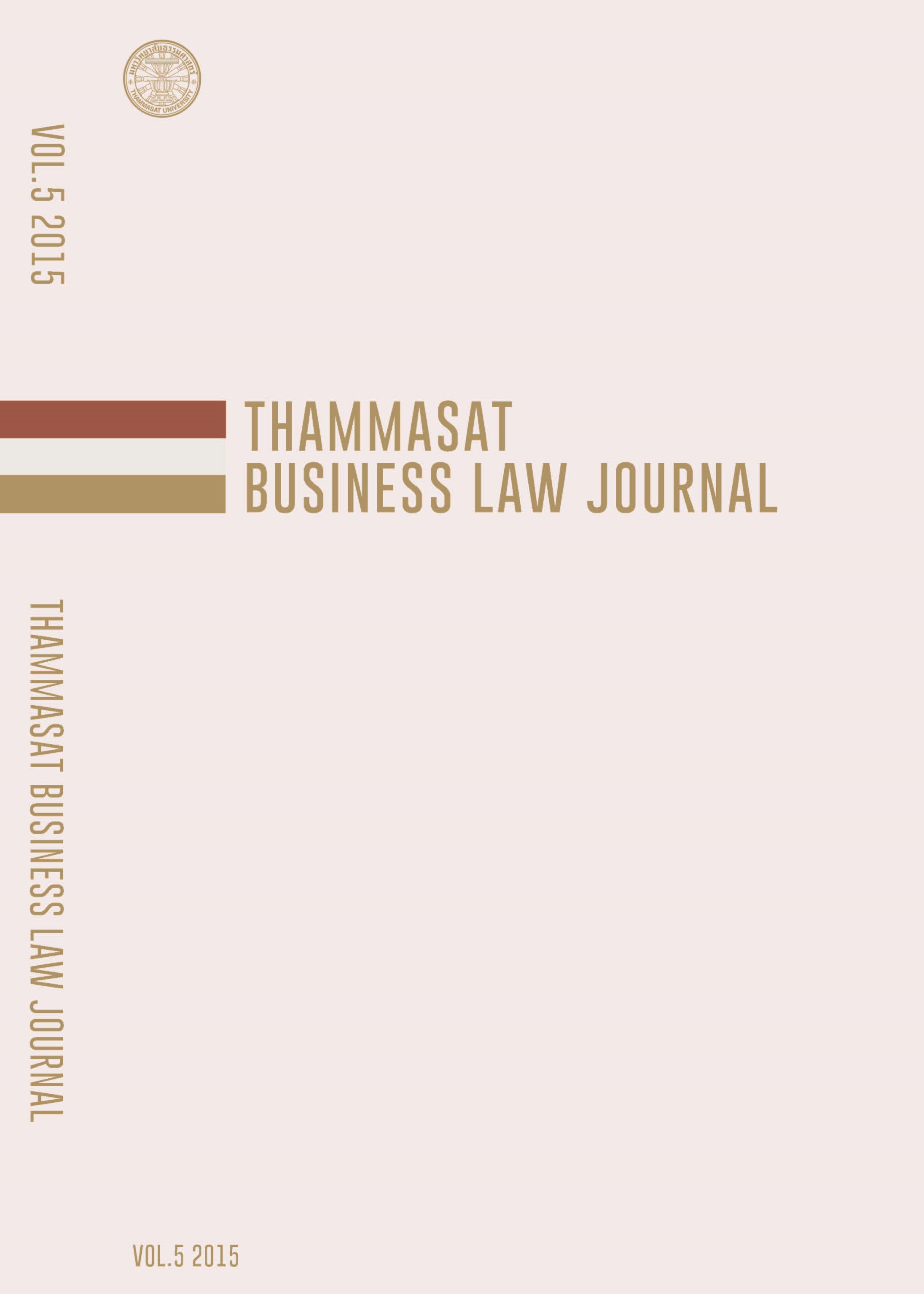PROTECTION OF TRADITIONAL KNOWLEDGE ASSOCIATED WITH PLANT GENETIC RESOURCES: A COMPARATIVE STUDY OF THAI LAW AND INDIAN LAW
Main Article Content
Abstract
Traditional knowledge, specifically traditional knowledge associated with plant genetic resources, has been treated as public knowledge for free exploitation without due respect or concern for the effort taken by the indigenous and local communities to preserve and develop such knowledge. Globalization has caused its misuse which in turn, has led to bio-piracy and unsustainable use of such knowledge. Consequently, the protection of traditional knowledge has been a subject of increasing importance. In this regard, several countries have developed legal mechanisms for protecting their traditional knowledge and plant genetic resources either through intellectual property protection, a sui generis system, or a combination of both.
Thailand, as one of the countries rich in traditional knowledge and plant genetic resources, has opted for a sui generis system by enacting two major laws directly addressing the protection of traditional knowledge and plant genetic resources. First, the Thailand Plant Varieties Protection Act B.E. 2542 (1999) aims to protect rights of plant breeders in order to promote innovative plant breeding activities and to protect the rights of farmers and local communities including related knowledge in respect of their participation in improving, conserving and making use of plant genetic resources. Second, the Thai Traditional Medicine Intelligence Act B.E. 2542 (1999) aims to protect Thai traditional medicine and also to manage access to traditional knowledge and biological resources in herbal medicine. However, both laws provide neither a functional system nor an effective enforcement.
This thesis aims at studying the characteristics and related fundamental principles of traditional knowledge specifically on the legal measures for protection of traditional knowledge associated with plant genetic resources, analyzing the problems of the Thailand Plant Varieties Protection Act B.E. 2542 (1999), the Thai Traditional Medicine Intelligence Act B.E. 2542 (1999), and proposing suggestions in order to resolve the difficulties arising from both of the Acts. Furthermore, the study will provide recommendations to enhance the effective enforcement of the Acts and develop a practical system for the protection by comparing them with Indian laws and legal system which is considered to be one of the most effective laws and systems in protecting its traditional knowledge and plant genetic resources.
Consequently, this thesis proposes new legislative solutions to amend the law concerning the management of access and benefit-sharing and the protection of farmers’ rights and communities’ rights. In addition, the establishment of a central database is suggested to collect and archive Thai traditional knowledge including Thai traditional medicine.
Article Details
References
Kudngaongarm, Panamas. “Thai Traditional Medicine Protection (Part I).” Thailand Law Journal, no. 14, 2011. http://www.thailawforum.com/articles/
Thai-traditional-medicine-protection-part1.html (accessed March 21, 2015).
Malik, C.P., Wadwani, Chitra., and Kaur, Bravneet., editor. Crop Breeding and Biotechnology. Jaipur: Pointer Publishers, 2009.
Venkataraman, K. “Access and Benefit Sharing and the Biological Diversity Act of India: A progress report.” Asian Biotechnology and Development Review, no. 3, 2008: 69-80.
วงศ์ทิพย์, วิวิธ. “แนวทางการคุ้มครองภูมิปัญญาท้องถิ่นของไทย: ศึกษาเปรียบเทียบประเทศไทยกับประเทศอินเดีย.” วารสารสุทธิปริทัศน์, no.87, 2557:323-344. (Vongthip,Vivit. “The Guiding Principle to the Protection of Traditional Knowledge in Thailand: A Comparative Study between Thailand and India.” Suthiparithat Journal, no. 87, 2014:323-344.
Gupta, V.K., “Traditional Knowledge Digital Library.” Paper presented at the Sub-Regional Experts Meeting in Asia on Intangible Cultural Heritage: Safeguarding and Inventory-Making Methodologies, Bangkok, Thailand, 13-16 December 2005.
Koonan, Sujith. Developing Country Sui Generis Options: India’s sui generis system of plant variety protection. 2014. https://www.quno.org/sites/default/files/
resources/QUNO%20India%20-%20plant%20variety%20protection%20%20
2014.pdf (accessed March 16, 2015).
Lertdhamtewe, Pawarit. “Implementing the Agreement on Trade-Related Aspects of Intellectual Property Rights (TRIPS Agreement): A Case Study of Thailand’s Plant Protection Regime.” ANZSIL–SCIL Research Symposium on International Economic Law. 2011. https://www.academia.edu/1205715/Implementing_the_
TRIPS_Agreement_A_Case_Study_of_Thailands_Plant_ Protection_Regime (accessed June 20, 2015).
Ramanna, Anitha. Environment and Production Technology Division “India’s Plant Variety and Farmers’ Rights Legislation: Potential Impact on Stakeholder access to Genetic Resources.” EPTD Discussion Paper. 2003. http://ageconsearch.umn.edu/
bitstream/16105/1/dp020096.pdf (accessed March 17, 2015).
Ramanna, Anitha. The Fridtjof Nansen Institute. “Farmers’ Rights in India: A Case Study.” FNI Report. 2006. http://fni.no/doc&pdf/FNI-R0606.pdf (accessed March 17, 2015).
Research and Information System for Developing Countries India Habitat Centre.
“National Study on ABS Implementation in India.” The ABS Capacity Development Initiative in collaboration with the Government of India. 2014. http://www.abs-initiative.info/fileadmin/media/Knowledge_Center/Pulications/
ABS_Dialogue_042014/National_study_on_ABS_implementation_in_India_20140716.pdf (accessed April 11, 2015).
Shenoy, Yeshwanth. “An Introduction to the Biological Diversity Act, 2002.” National Conference on Biodiversity, Development and Poverty Alleviation, May 22, 2010. http://www.upsbdb.org/pdf/Souvenir2010/11.pdf (accessed March 5, 2015).
Council of Scientific and Industrial Research [CSIR]. “Traditional Knowledge Digital Library (TKDL).”
“Definitions of Traditional Knowledge.”
Hanamshet, Kritika., Abinash, Sahoo., Singh, Abhishek A.P., Clyde, Vincent., and Priyanka, Yadav. “Traditional Knowledge Protection.”
“Traditional Knowledge Digital Library.”
Uttasart, Chavalit. “The relevance of traditional knowledge to intellectual property law.” < https://www.aippi.org/download/commitees/232/GR232thailand.pdf > (accessed June 27, 2015).
“กรมทรัพย์สินทางปัญญายกเลิก ขอรับบริการข้อมูลภูมิปัญญาท้องถิ่นไทย.” (“Department of Intellectual Property repealed the regulation concerning the establishment of databases on Thai local intelligence.”
The Biological Diversity Act, 2002
Ministerial Regulation on Rules, Procedures and Conditions for collecting, procuring or gathering general domestic plant varieties or wild plant varieties for the purpose of variety development, education, experiment or research for commercial interest and making a profit-sharing agreement B.E. 2553 (2010)
The Protection of Plant Varieties and Farmers’ Rights Act, 2001
Thailand Plant Varieties Protection Act B.E. 2542 (1999)
The Thai Traditional Medicine Intelligence Act B.E. 2542 (1999)


